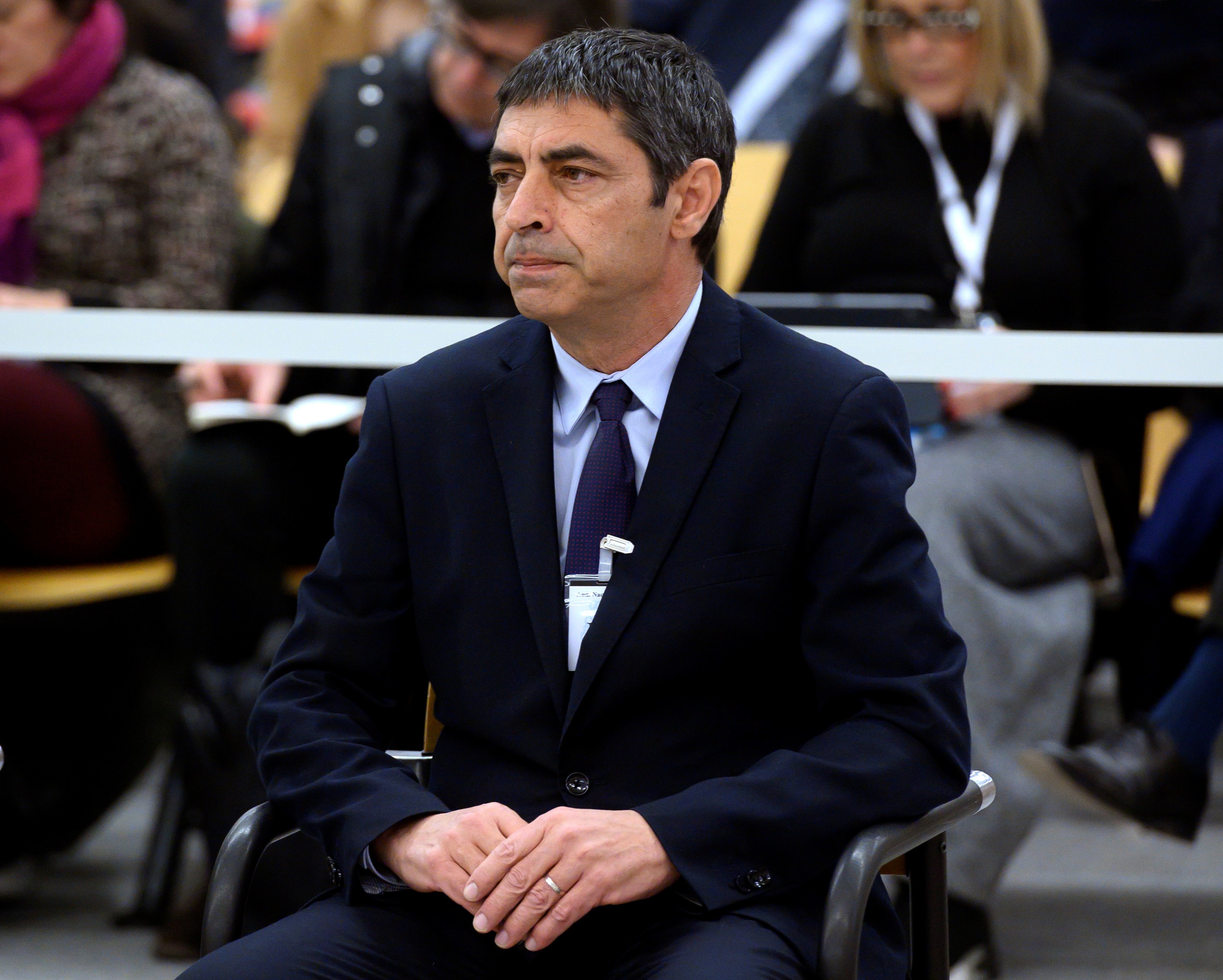They've changed the charges, but have hardly altered the jail time demanded. Prosecutors in the trial of the chief of Catalonia's Mossos d'Esquadra police, Josep Lluís Trapero, and three other police leadership figures, have now altered the accusation from rebellion to sedition, but are still calling for the police chief to serve a 10 year prison sentence for his alleged part in the Catalan independence referendum in October 2017. The change in the accusation in this trial, interrupted by the coronavirus emergency, parallels the Supreme Court trial of the 12 Catalan political and civil leaders last year, in which most of the defendants were also originally charged with rebellion, before being finally convicted to long jail terms for sedition.
At today's very short internet court session when the trial resumed, the prosecutor also demanded 10 years' imprisonment for the two Catalan interior ministry officials in charge of the Mossos, Pere Soler and César Puig. The fourth police leader on trial, Mossos superintendent Teresa Laplana continues to face the original sentence demanded of four years' prison for sedition.
The court was in session for just six minutes this Monday, enough for the prosecutors to defy some of the predictions made about how they would proceed with the conclusion of the case after its delay. In the end, the public attorneys changed the offence which they are claiming that three of the police administrators had committed, while persisting in the long jail terms they are seeking; the written conclusions presented today show that the prosecution is following the same lines as in last year's Supreme Court trial. In addition to the terms of imprisonment sought, disqualification from holding public office, and fines of 60,000 euros are also demanded. In the case of Trapero, the prosecutors also call for a specific disqualification of one year and 8 months from serving as a police officer.
At the end of the prosecutors' written conclusions, they also set out a plan B: requesting that, if the court does not see the crime of sedition proven, for it to find Trapero, Soler and Puig guilty of disobedience, an offence which would not require them to serve prison time.
The prosecution asserts that on 20th September 2017, at a protest outside the Catalan economy ministry, Josep Lluís Trapero and Teresa Laplana "cooperated decisively, consciously and intentionally with the aims pursued by the Catalan institutions" and that they prevented the carrying out of the judicial search which was underway inside the ministry "in the legal conditions required by the legal system". This was the same protest for which pro-independence civil group leaders Jordi Cuixart and Jordi Sànchez are currently serving nine year jail terms for sedition.
Despite the testimony of the Mossos police chief during the trial, the prosecutors still maintain that "the conditions imposed by Jordi Sànchez on the judicial search commission during that day were fully assumed by the accused Josep Lluís Trapero, who through his deliberate failure to act, avoided bringing to an end the serious public order problem which was occurring and which impeded the normal activity of the judicial commission."
The second part of the case against the accused relates to the independence referendum the following week, on 1st October 2017. Here again, prosecutors Miguel Ángel Carballo and Pedro Rubira are sticking to their thesis that the defendants Pere Soler, at that time Mossos director general, and César Puig, secretary general of the Catalan interior ministry, along with Trapero himself, had a "joint strategy" and that "not only did they fail to take any action to prevent the referendum, but they also contributed decisively to the fact that the Mossos d'Esquadra body was put at the service of the secessionist plan."
The prosecution describes as "mere formalities" the 4,469 actions taken by the Mossos police in the two days preceding the referendum to declare the illegality of the vote at the locations to be used as referendum polling stations, because they did not the seal off premises or make any warnings to the people who were already occupying them.
The defendants Josep Lluís Trapero, César Puig and Pere Soler along with Catalan interior minister Joaquim Forn, acted together, assert the prosecutors: they "jointly devised the steps to be followed on September 29th and until October 1st", and this plan included "the execution of the joint strategy and the apparent fulfillment of the orders received from the Spanish prosecution service and the judiciary." The accusation asserts that they devised an action plan that was "fraudulent" and at the same time "deliberately ineffective."
The trial will resume next week to hear the final statements from all parties. It will be held in person, at the main centre of the National Audience court in San Fernando de Henares, near Madrid, because this centre is best adapted to Covid-19 safety measures. Next week, all of the defendants and lawyers will travel to Madrid to face the final stage of the trial that is set to be placed in the hands of the judges on June 17th.

